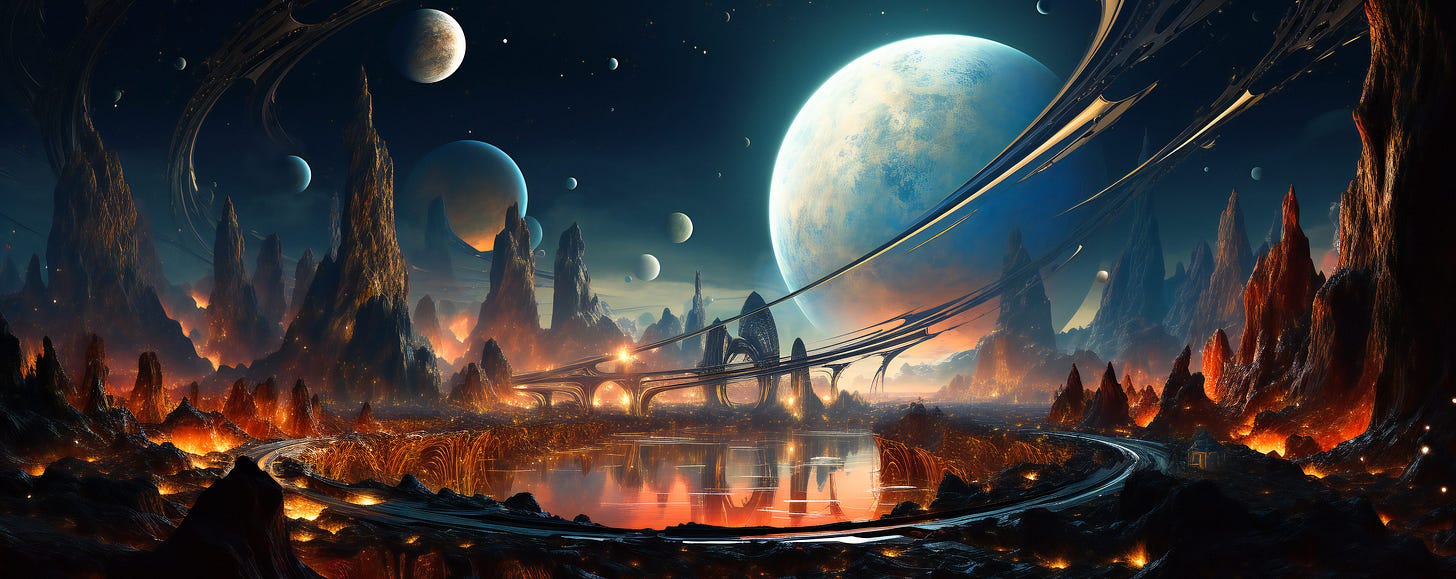Planet 41 (Contemplation)
I can’t count the nights I’ve spent staring at the vestiges of Planet 38, which is now a cloud of filaments and stones circling the great planet and other moons of our messiah. To stare at Planet 38 is to stare at the previous Finale from a thousand Matriarchal years ago, wondering where the ghosts of its people who lost that bitter contest have gone.
Do they scrape the skies with their souls? Did they descend into the mortar of ancient ruins from cities we built before mechanical technology left our planet? Do they await an opportunity to proffer advice as the next Finale looms?
Do they reside in our new home, whose vast expanse was built by architects harnessing the power of quantum mechanics that looks like magic to the other envious planets of our solar system?
Maybe they scattered to the other moons.
Or, perhaps, they are silent through a final death we don’t fully understand.
That’s what Reylon thinks.
“The Matriarch took the ones she found useful,” she says as one of her tendrils pours a tall flask of Eradian tea. Her long lips stretch into the glass, she takes a drink, closes her middle eye.
“The others,” she continues, “are simply a vanished cluster of molecules transformed into that:” One of her eyes stretches upward toward the rings of the Matriarch. “Not all ancient texts are useless. And this is what they teach us.” She laughs shrilly. “I suspect the Matriarch found few that were useful from that worthless orb.”
“There are holos of splendorous cities from Planet 38,” I say in rebuttal. My mind conjures one. It reveals tall, gleaming spires made of glass and diamond. I spread it across the room, which is decorated with art and furniture from what was once a proud planet. The buildings in the holo mix with translucent elegance into the room’s décor, waving like tall plants in the wind, which is a lie, because, in reality, they were sturdy structures impervious to Planet 38’s furious storms.
Reylon disdainfully waves the holo away with a flattened tendril, her yellow villi stretching and arching as the rest of her skin turns from green to orange in a formal recertification of her dismissal. “Dirty, filthy creatures. They lost the contest almost with a bizarre form of aplomb. Nearly as if they went into the contest with utter confidence in their own demise.”
“They thought they could win with pure aggression,” I agree. Reylon passes me a glass of tea. I take a long sip, my lips reaching toward her and into the glass to finish it almost before her tendril has completed its minor mission of delivering it to me.
“I don’t think I’ve ever seen anyone so eager for a sip of Eradian tea,” she laughs.
I feel its effects immediately. A smile wraps around the trunk of my neck. “I’ll need a lot of it if I’m chosen to compete in the Finale.”
“The planet has been preparing for the next Finale for five thousand years,” she replies. “You will not need Eradian tea, which can be an unpleasant dependency if you’re not careful.”
Reylon measures nothing by Matriarchal time. She’s a Trestonian. Dangerously subversive against the Matriarch. She directs her arguments for her subversion from the simple fact of our free will. Trestonians believe we are destined to formalize a decoupling with the Matriarch, and that, in fact, the Matriarch yearns for one planet to conquer the rest as it ascends from the monotony of millennial Finales.
As such, Reylon would not acknowledge that Finales occur every Matriarchal millennium. She would say they occur every five thousand years, because, in her view, it is our planet that is destined for final ascension. It is our planet’s time against which everything should be measured, she would say, because our planet will be the only one left when the end of eons begins. Aside, of course, from the Matriarch that orbits the primary sun and around which all fifty of the other habitable planets revolve.
To suggest that the Matriarch is not supreme, that somehow a world like ours could overpower her, would be blasphemous, but I know Reylon thinks it anyway.
It’s all a bit too theological for my tastes. I only want our planet not to be the one to lose the upcoming Finale. It’s a simple focus, one that Reylon doesn’t see. She is hoping to also be a contestant, but as a Trestonian, she has little hope of becoming one.
Sha (The Consumer)
“I’m looking forward to another satisfying meal.”
He enjoys the brief waiting period. If he wished, he could experience the pleasure of consuming all the planets at once, like so many others do in other systems within the galaxy. He enjoys involving the inhabitants because there are so many different sentient species in this system. Fifty planets full of them, all teeming with civilizations harboring the dreams of a hundred sentient species.
The feasting orgy from their massive influx of carbon when they are destroyed thrills him.
To contesting planets, a thousand of the mother’s years pass between meals. To Sha, just moments. Occasionally, he’ll stretch those moments out. He wonders if that is what aging feels like.
Dro (the Matriarch)
“Why do you challenge me? I am the daughter of God. We give birth to all your thoughts. Nothing you ask has not been answered.”
Sha is unrestrained: “You believe in your omnipotence, but it’s a lie. I am here to teach you of this lie. When you are finished with your lesson, your corpse will stretch out across the heavens in an orbital pattern consisting of nothing but the bile of a billion tiny rocks bearing the atomic markings of your insipidly stupid inhabitants.”
Dro considers this. “Bray shall decide, as she decides who shall live and who shall die through The Finale, for that is her voice on these matters. She has empowered the people within this star system to discover the path to enlightenment through the simple power of victory. Neither of us is part of this equation. You know this.”
Sha replies with a storm of anger, “Not victory, loss. The Finale is about loss, nothing more. The inhabitants of the losing planet are lost, the planet is lost, and the only substantial result of the Finale is a reduction in the number of inhabited planets by one.”
Sha then considers a question he never has. What if Dro were to become a participant in the Finale?
“This is not viable,” says Dro upon hearing that thought. “I am an inviolable part of Bray, of God — sacred, sacrosanct, immutable. Now. Be gone.”
Planet 41 (A Proposal)
I find it amusing when I learn that Reylon gathered Trestonian priestesses from across the world to pray to Bray for the inclusion of the Matriarch’s planet in the Finale. This is simply not done. The messiah planet cannot participate. This has always been a sacrosanct tenet of all religions on all fifty planets (now forty-two). Bray, that distant, massive gas planet at the farthest reaches of our star system, the Mother Superior goddess that controls time itself, will not sacrifice her child to the machinations of simpler beings.
Besides, the Matriarch planet’s inhabitants have no technology. Their purpose is to be peaceful stewards of the Matriarch, who revolves around our suns at fantastic speeds and dominates the sky as she tows every other inhabited world in the system, each of which in turn revolves around her as one of the mother’s children of our cosmos.
“Such intervention by Sha would be akin to a fallen angel,” I say when she informs me of her plans to pray to Sha, “as if such a thing could possibly exist.”
“Sha is the consumer,” responds Reylon. “He ingests the souls of the losing planet. He will surely agree to our request. The prayer has never been offered. No species has ever prayed to Sha.”
Reylon’s proposal is merely a strategy to win the Finale, anyway. No harm can come of this other than to the losing planet. The inhabitants of the planet who attempt to destroy the messiah planet will almost assuredly become another set of rings around the Matriarch.
An interesting strategy, I muse to myself. Reylon is correct: If the Matriarch is allowed to participate in the Finale, surely one of the other planets would be egotistical and naive enough to attack the Matriarch’s planet if for no other reason than the simple fact that its unarmed, peaceful inhabitants are helpless. The Matriarch’s wrath would destroy the attacking planet, and we would survive the Finale, which is all that matters. The attacking planet would be turned into dust by her omnipotent power. I am unable to deny the brilliance of this strategy.
I still have questions: “Even if the Matriarch is instructed by Bray to participate, which seems unfathomable to me, have we ever heard of such a thing as Dro’s anger? Are there any stories of her wrath? Any at all? What if she merely allows the attack to proceed through the simple act of pacifism?”
“Even god planets have a survival instinct,” answers Reylon.
Planet 41 (The Combatant)
My years of preparation are subsumed by an unexpected choice: Reylon will be the contestant. She, who has never guided one of our armies in training like I have for the past several hundred years, will lead Planet 41 into the Finale.
I sense nothing but failure; my failure, certainly, at having not been chosen, but also impending failure, for the choice made by Sha, a choice made, I fear, because Sha desires to see our planet made into a part of the Matriarch’s glorious ring system. For, surely, that is what will become of us with Reylon as the choice to lead our quantum armies.
But why? Why does Sha wish our demise? What have we ever done to him?
The Finale
The battle among the early contestants takes place among primitive planets. One of them is the likely loser.
The loser of the most recent Finale, Planet 38, was not a primitive planet, however. Its demise was a surprise. Devout worshipers, of course, consider losing to be a great sacrifice — an honor — as the rubble of the defeated planet becomes a part of the Matriarch’s ring system. This is an easy thing for the winners to cheer.
The concern on our planet, Planet 41, is that this is our first Finale without traditional mech armies. No planet has attempted a quantum army before.
We could lose. Led by Reylon, we could lose. I find anger building within me as the Finale opens its early rounds. I don’t blame Reylon for this, even if I can argue that she betrayed me. Was it betrayal? Or something else? I don’t know. It doesn’t matter. Sha chose Reylon to lead our armies, not me, or someone else more qualified, and that’s all that matters.
Reylon has done well. Our quantum armies quickly decimated other planets, as Reylon’s armies marched through the Matriarchal moons as if the helpless planets were nothing but seeds to be eaten by avian predators.
But Reylon’s plan seems foiled. No planet has dared to attack the Matriarch. Worse, the stronger planets seem to have bonded against us in an alliance. But they can’t penetrate our quantum shield because the shield shrouds us in the secrecy of time. It is as if our planet no longer exists. Other planets simply cannot find us.
Until they do.
I find myself awakened by a thunderous onslaught of machines, explosions, and fire. I curse myself for taking some time away from the Finale. Watching and awaiting its results over the years can be exhausting. One needs pause.
What has Reylon done to allow such a thing? The quantum shield should have been impenetrable.
When I step outside, I see that the entirety of the Matriarch is in flames like a small sun. Then, as if it had never happened, the machines are gone. Standing in front of me is Reylon, accompanied by what appears to be a male of our species, although I cannot be sure, for they died out eons ago.
Reylon herself transfigures into the same kind of creature. She, or he, can read my thoughts as it blends into the body next to it. It smiles sardonically as it says in two voices together, “We are Sha. We are the consumers.” The creature looks into the sky. “The matriarch is the consumed.”
“But how?” My question is more a plea than a query.
“The invincibility of time has turned against her. We merely introduced her to a much later era, billions of years into the future, where she alone endures the punishing natural expansion of our largest star.”
“But she is our goddess. Our matriarch. She is inviolable.”
Sha’s laugh echoes against the clouds above and says, “Fool! The inviolability is ours. We have stepped across time to ruin her. And all her moons will be ruined with her.”
“So will our planet, then, Reylon.”
“Reylon is no more. And this planet now lives alone as a moon of what would be the Matriarch in another time, but is now nothing but an empty vessel of rotating gas.”
“Where is the warmth of her fires’ rage, then?” I ask, as the Matriarch’s appearance transforms into a gorgeous blue hue.
At that moment, Sha collapses into a reddish ooze in front of me. I hear a distant call that sounds like it comes from the clouds: “Come to me, child,” it says. “I am the mother of the universe, and your journey through the pits of evil is now complete.”
My body disappears, and I realize that the Matriarch was here all along, and that the real illusion was the violence and evil of the millions of years before this moment.
Notes
This first appeared in the Kraken Lore. It was created for Jonathon Sawyer’s Monday Mashup #67. For some reason, they published it as is. I swore to them I wasn’t on LSD when I wrote this.
Seems like a few of my Kraken Lore stories have messianic themes. I have no idea why this is so, other than C.S. Lewis led me to wonder about messiahs on other planets when I read his Perelandra trilogy about a million years ago, Earth time. If these kinds of things interest you, you might also be interested in my short story about a dolphin messiah:
And a cat messiah:
Thanks for reading!






“ I swore to them I wasn’t on LSD when I wrote this.” 😂
I don’t think I’ll ever forget long lips with her third eye.